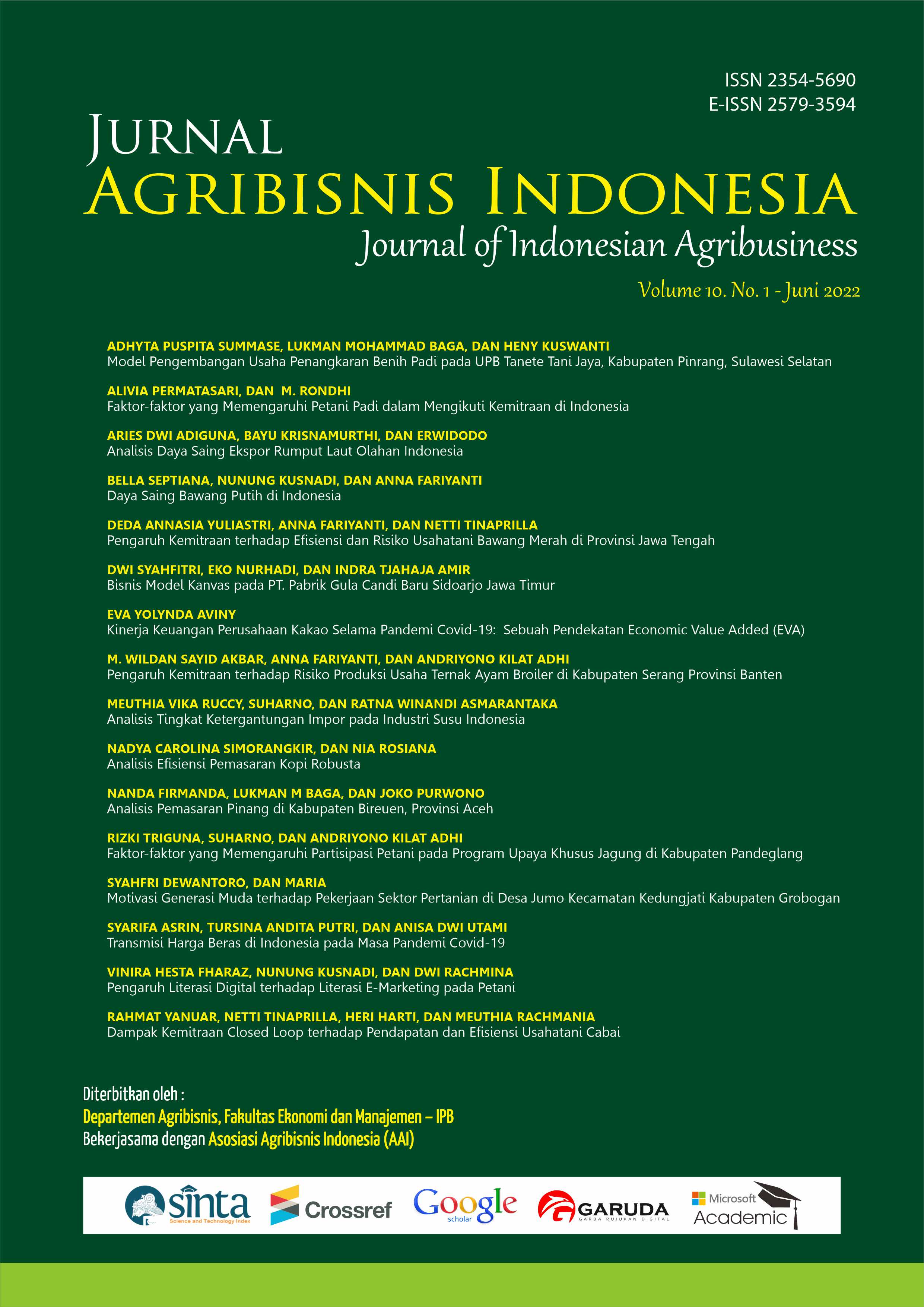Motivasi Generasi Muda Terhadap Pekerjaan Sektor Pertanian di Desa Jumo Kecamatan Kedungjati Kabupaten Grobogan
Main Article Content
Abstract
The number of young people who want to work in the agricultural sector is decreasing compared to the non-agricultural sector. A farmer who has a young age usually has high enthusiasm for trying new things in determining suitable commodities. The education level of those working in the agricultural sector is low, with the majority having or not completing primary school. The level of education is very important to absorb new information and technology. Income is one of the factors for someone to determine a job because it is to meet the needs of daily life. Income in the agricultural sector depends on crop yields and fluctuations in market prices. The social environment plays an important role in the mindset of the younger generation in determining a worker. This study aims to determine the relationship between age, education, income, and social environment with the work motivation of young people in the agricultural sector. The approach used is descriptive quantitative with a purposive sampling method. The analytical method used is correlation analysis using Spearman rank. The younger generation studied were aged 20-44 years. The research location is in Jumo Village, Kedungjati District, Grobogan Regency, Central Java. Respondents consist of 50 young people who work in the agricultural sector using open land. The results showed that there is a significant and positive link between variables of age, education, income, and social environment with the younger generation's motivation to work in agriculture.
Downloads
Article Details
Jurnal Agribisnis Indonesia (JAI) is an Open Access Journal. The authors who publish the manuscript in this journal agree to the following terms:
Creative Commons License
JAI is licensed under a Creative Commons Attribution 4.0 International License. This permits anyone to copy, redistribute, remix, transmit, and adapt the work provided the original work and source are appropriately cited.
This means:
(1) Under the CC-BY license, authors retain ownership of the copyright for their article, but authors grant others permission to use the content of publications in Jurnal Agribisnis Indonesia in whole or in part provided that the original work is properly cited. Users (redistributors) of JAI are required to cite the original source, including the author's name, JAI as the initial source of publication, year of publication, volume number, issue, and Digital Object Identifier (DOI); (2) Authors grant JAI the right of first publication. Although authors remain the copyright owner.
References
[BPS] Badan Pusat Statistik. 2018. Hasil Survei Pertanian Antar Sensus. Badan Pusat Statistik. Jakarta.
Carrillo, F., Maria RC., Tiziana V., dan Alberto Z. (2013). Aging And Succession On Italian Farms. Journal National Institute of Agricultural Economics, 1, 39-55. 10.22004/ag.econ.166005
Chandra D. 2004. Persepsi Pemuda Desa Terhadap Pekerjaan Di Sektor Pertanian Dan Minat Kerja Di Kota [Skripsi]. Bogor: Institut Pertanian Bogor
Hamyana. (2017). Motif Kerja Generasi Muda Di Bidang Pertanian: Studi Fenomenologi Tentang Motif Kerja Di Bidang Pertanian Pada Kelompok Tani Di Kota Batu. Mediapsi 3 (1), 34-42.
Herlina, T. 2002. Orientasi Nilai Kerja Pemuda Pada Keluarga Petani Perkebunan [Skripsi]. Bogor: Institut Pertanian Bogor.
Jhingan, M. L. 2003. Ekonomi Pembangunan Dan Perencanaan. Jakara: PT Raya Grafindo Persada
Khairudin. 1992. Pembangunan Masyarakat Tinjauan Aspek Sosial Ekonomi Dan Perencanaan. Jakarta: Liberty
Panurat, Sitty M. 2014. Faktor-faktor yang mempengaruhi minat petani berusahatani padi di desa sendangan kecamatan kakas kabupaten minahasa [Skripsi]. Manado: Universitas SAM Ratulangi Manado.
Simanjuntak PJ. 1985. Pengantar Ekonomi Sumber Daya Manusia. Depok: Fakultas Ekonomi Universitas Indonesia.
Soekartawi. 2005. Agribisnis Teori dan Aplikasinya. Jakarta: Raja Grafindo Persada
Sugiyono. 2010. Metodologi Penelitian Pendidikan. Bandung: Alfa Beta
Sugiyono. 2014. Metode Penelitian Kuantitatif Kualitatif dan R&D. Bandung: Alfa Beta
Supriyati. (2010). Dinamika Ekonomi Ketenagakerjaan Pertanian: Permasalahan dan kebijakan Strategi Pengembangan. Analisis Kebijakan Pertanian, 8(1), 49-65.
Susilowati, S. H. (2016). Fenomena Penuaan Petani Dan Berkurangnya Tenaga Kerja Muda Serta Implikasinya Bagi Kebijakan Pembangunan Pertanian. Forum Penelitian Agro Ekonomi, 34(1), 35-55.
Tarigan, Herlina. (2004). Representasi Pemuda Pedesaan Mengenai Pekerjaan Pertanian: Kasus Pada Komunitas Perkebunan Teh Rakyat Di Jawa Barat. Bogor. Pusat Penelitian Dan Pengembangan Sosial Ekonomi Pertanian, 1(29).
Werembinan. (2018). Persepsi Generasi Muda Terhadap Kegiatan Pertanian Di Kelurahan Buha Kecamatan Mapanget Kota Manado. Agrisosioekonomi Unsrat, 14(3), 123 – 130.
Winardi, J. 2001. Motivasi Dan Pemotivasian Dalam Manajemen. Jakarta: PT Raja Grafindo Persada

